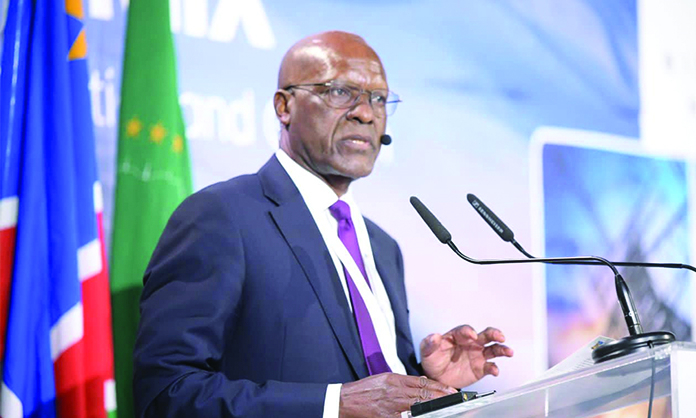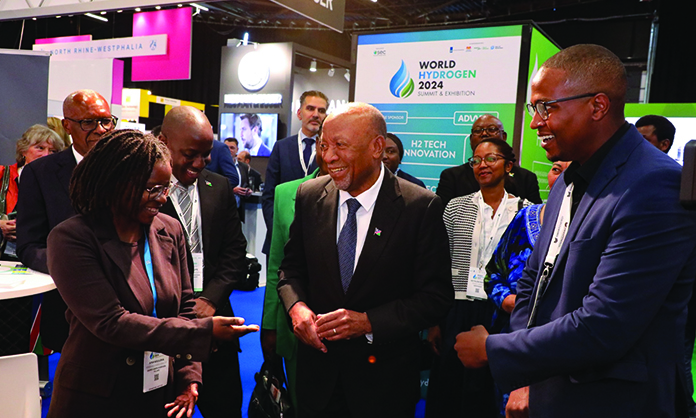Mines and energy minister Tom Alweendo has called for the increased mobilisation of strategic funding for climate-friendly projects.
Speaking at the World Hydrogen Summit in The Netherlands yesterday, Alweendo noted the 17% rise in investment in the low-carbon energy transition in 2023, reaching N$1,8 trillion.
Alweendo told the gathering Namibia has the potential to become a global leader in green hydrogen production.
“Today, I stand here recognising that indeed Namibia is not alone as we walk this adventurous journey,” Alweendo said.
He noted that the green hydrogen molecule is now a key cornerstone in the developmental agendas of so many African nations.
Alweendo said it was the late president Hage Geingob’s vision and in 2021, he openly embraced the concept that green hydrogen could unlock significant new horizons for the Namibian people.

He recognised the impressive initiatives undertaken by fellow African nations, including Morocco’s green hydrogen offer, Kenya’s green hydrogen guidelines, South Africa’s green hydrogen commercialisation strategy and Mauritania’s attractive incentive package.
He pointed to the surge in global commitment to decarbonising net-zero emissions stemming from COP26 since 2020.
Alweendo added that the doubling of the number of countries setting such targets, combined with policy instruments like carbon taxes and incentives, will drive a global push towards a low-carbon industrial sector, presenting a significant opportunity for Africa.
“It is clear, therefore, that governments and investors that embrace the green agenda will have a sustainable advantage in the race for scarce capital,” said Alweendo.
He added that Africa’s rich endowment of critical minerals essential for clean technologies, coupled with green hydrogen production, was identified as a generational opportunity for prosperity.
“As Africans, we should realise that when coupled with green hydrogen, this natural resource endowment presents a generational opportunity for us to deliver long lasting prosperity for our people and boost intra-African trade,” he added.
He emphasised the need for “green industrialisation” to connect domestic, regional and global economic agendas.
Alweendo further said Namibia’s green industrialisation blueprint was presented as a roadmap for achieving this vision and the blueprint acknowledges existing challenges like a polarised labour market and an over-reliance on public investment.
He emphasised that this vision is shared across Africa, as enshrined in Agenda 2063.
Alweendo concluded with an invitation to the Global Africa Hydrogen Summit, to be held in Windhoek in September.
He said the summit is envisioned as a platform to elevate strategic conversations on green hydrogen and its potential to transform Africa.
Speaking at the same event, president Nangolo Mbumba positioned the nation as a front runner in the global green hydrogen race.
Mbumba highlighted the longstanding partnership between Namibia and The Netherlands.
“Namibia, like many African countries, views the 21st century as a potentially transformative era for the continent, in which we can utilise new, greener and cleaner technologies to leapfrog towards industrialisation and subsequent economic transformation,” he said.
Mbumba identified green hydrogen as a critical driver for job creation, poverty reduction and regional stability.
He acknowledged Geingob’s visionary leadership and recognition of the sector’s potential in 2021 and commended his foresight in emphasising its long-term benefits for future generations.
Mbumba detailed Namibia’s burgeoning green hydrogen landscape and the nation’s nine ongoing projects across two developing hydrogen valleys, with a potential third on the horizon, thanks to Geingob.
He invited attendees to explore Namibia’s dedicated exhibition at the summit, showcasing project updates and emerging infrastructure developments.
Mbumba emphasised green hydrogen’s potential to transform logistics.
“To enhance this ambition, we are now developing an ammonia bunkering hub and a green hydrogen-powered train to decarbonise shipping and long-haul logistics routes, ensuring that goods and commodities transported via our port infrastructure minimises both scope 2 and scope 3 emissions,” he said.
Mbumba encouraged participants to leverage the summit for collaboration and progress in the hydrogen sector.
Namibia is proud to be a leader in this transformative journey, he said.
Stay informed with The Namibian – your source for credible journalism. Get in-depth reporting and opinions for
only N$85 a month. Invest in journalism, invest in democracy –
Subscribe Now!






